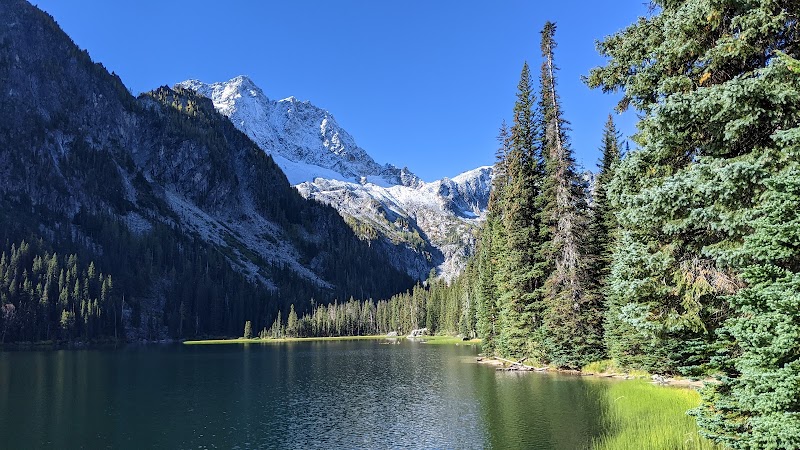
Okanogan-Wenatchee National Forest Adventures
Okanogan-Wenatchee National Forest offers diverse landscapes and abundant outdoor activities across its lush valleys, alpine ecosystems, and rugged mountains.
Popular Activities
Ascending the Granite Giants: An Adventure Guide to Climbing Okanogan-Wenatchee National Forest
In the heart of Washington State lies a climber's haven, the Okanogan-Wenatchee National Forest, a sprawling expanse where towering pines stand as natural guardians to the craggy cliffs begging for ascension. The forest’s labyrinth of trails and stone beckons adventurers with promises of thrill and profound communion with the wilderness. As you step into this world, the crisp mountain air greets you, carrying whispers of the challenges that lie ahead, yet teasing you with the allure of panoramic vistas.
First, the practicalities. Okanogan-Wenatchee's climbing areas are varied granite domains, each offering their own unique set of challenges, from face climbs to crack conquests. It's crucial to arm yourself with a guidebook for the region. Information on access trails, seasonal conditions, and permitted climbing zones are indispensable assets for any serious climber. Many of these rocks stand like ancient guards, daring you to chart a path across their weathered faces. Ensure you have a sturdy pair of climbing shoes to negotiate the rock’s unforgiving surface—an essential ally in your upward venture.
It’s important to plan your adventure with the natural rhythms of the forest. While the summer months bathe the granite in opportune warmth, late spring and early fall offer cooler conditions, best for an energized climb without the rush of summer crowds. As you rise above the forest floor, each move upward is rewarded with breathtaking views—a vista of evergreen waves rolling across the horizon, pierced occasionally by the bald domes of granite and distant peaks that pierce the sky like jagged teeth.
Hydration is paramount here, particularly when the sun hangs high and hot in the azure canopy above. Carry ample water, and remember to replenish your bottles at the generous streams and lakes that nestle within this landscape. But tread respectfully—these bodies of water, vital lifelines of the wilderness, both supply and sustain the delicate ecosystems that surround them.
As you engage with the rock face, let each reach and hold connect you deeper to the past eons of geological history, written in the striations and textures beneath your fingertips. Your senses will come alive— the scent of pine needles crushed underfoot, the sight of a bald eagle gliding across the open canopy, and the feeling of a gentle breeze cooling your perspiration-dappled skin during an ascent are all integral notes in this natural symphony.
The cliffs of Leavenworth stand among the most celebrated climbing spots here. Whether you’re a first-timer or an experienced rock whisperer, the diverse climbing areas cater to various skill levels while ensuring a feast of scenic beauty. The rock itself plays the role of both adversary and teacher, its surface requiring warm-up climbs to familiarize oneself with its intricacies, before attempting more complex routes.
To maximize your day’s efforts, start at dawn. The trailheads offer hints of what is to come, with dew-kissed foliage guiding you to the climbing zones. Keep an eye out for the vibrant display of wildflowers in spring—nature’s own welcoming party, infusing color into the rich green canvas of the forest.
While the climb thrills, it’s equally essential to heed safety. Check your gear; ensure harnesses, ropes, and carabiners are secured and in impeccable condition to safeguard against mishap. Partner with fellow climbers, as companionship can mean mutual support and shared wisdom during demanding ascents.
Conquered summits deliver more than a simple thrill; they offer a retrospective on human grit and the uncomplicated joys of nature’s majesty. As the sun slinks into the horizon, painting the granite in hues of amber and gold, you are left in the twilight glow with a sense of accomplishment and a story penned amongst stone giants and skyward ambitions.
Plan Your Visit
Everything you need to know to prepare for an unforgettable trip to Okanogan-Wenatchee National Forest.
Entrance Requirements
No entrance fees; Northwest Forest Pass required for parking at most trailheads.
Best Time to Visit
Summer and early fall are best for hiking and wildlife viewing; winter offers excellent conditions for snow sports.
Visitor Information
Wenatchee Valley and Chelan Ranger Stations provide information and permits.
Getting There
Accessible via Highways 2, 97, and I-90; some high-elevation roads and trails are closed in winter.
Weather & Climate
Continental climate with warm, dry summers and cold, snowy winters. Rainfall is common in the western parts, while eastern areas are drier.
Conservation Efforts
Active conservation efforts target fire management and protection of endangered species like the grizzly bear. Invasive species and climate change pose ongoing challenges.
Camping in Okanogan-Wenatchee National Forest
Find the perfect spot to stay overnight and immerse yourself in the details.
Ingalls Creek Campground
Located along Ingalls Creek, suitable for tents. It's a base for hikers exploring nearby trails.
Lake Wenatchee Campground
Offers campsites with access to a sandy lake beach, ideal for families and water enthusiasts.
Top Trails
Colchuck Lake Trail
An iconic trail that ends at the breathtaking Colchuck Lake, nestled below the towering Dragontail Peak.
Pacific Crest Trail Section J
This challenging section offers some of the most scenic and remote stretches of the entire trail in Washington.
Stuart Lake Trail
A forested hike that offers views of towering peaks and lush valleys ending at the serene Stuart Lake.
Icicle Ridge Trail
Begins with a steep climb, rewarding hikers with panoramic views of the surrounding mountains and valleys.
Trailblazer Tips
Pack layers for varying weather, as conditions can change rapidly with altitude.
In spring and late fall, check trail conditions for snow or mud closures.
Popular trailheads can fill up quickly in peak season—arrive early or consider carpooling.
Bear canisters are recommended for backcountry camping to protect wildlife and your food.
